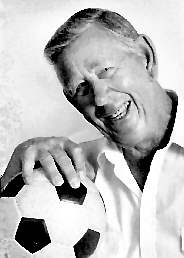| |
SIR Kenneth George Aston MBE :
.... an Englishman,
... a Lt. Colonel in the British Army,
... a Head School Master,
... a Soccer Referee & Mentor,
...The inventor of the Yellow and
Red cards
by...(FIFA.com)
Tuesday 15 January 2002
Article Reference |
 |
So simple
 + +  = =
 , but so effective!!! , but so effective!!!
One cannot imagine modern football without the
Yellow and
Red card,
terms that are now even used in the proverbial sense. They were
"invented" ...
ago by Ken Aston, an Englishman who sadly passed
away in October 2001, having made invaluable contributions to football
and to the art of Refereeing in particular.
Teachers must perform many roles in their profession and not just within
the confines of the classroom. In England, where sport has always been
an important part of the school curriculum, teachers often assume the
role of the Referee. Kenneth George Aston did just that in Essex in
1935. He had just turned 20 and was new to the world of teaching, when
he was asked to take charge of a football match. It is probably fair to
say that his pupils were more disciplined than the players at the FIFA
World Cup™ in Chile (1962) or in England (1966).
Defining moments...
Ken
Aston clearly enjoyed his time in the middle, and in 1936, he qualified
as a Referee. According to his obituary in the London daily newspaper
The Times, by the start of the 1960s, Ken Aston had worked his way up the
Referees' ladder, and was undoubtedly one of the top officials in the
country. His work was seldom tainted by controversy.
But that was to change dramatically at the 1962 FIFA World Cup™ in
Chile. Ken Aston was given the honor of Refereeing the opening game between
the host nation and Switzerland (3-1), a game that he controlled
impeccably. Impressed by his performance, FIFA decided to name Ken Aston in
place of the original Referee for the match between Chile and Italy, as
they saw the Englishman as an experienced and reliable figure.
Ken
Aston himself was not exactly overjoyed by FIFA's decision, as the
build-up to the match suggested the game would be a volatile one.
Chilean newspapers claimed that Italian journalists had penned articles
that cast doubt upon the beauty and morals of Chilean women. The
emotionally-charged game had now become a matter of honor, and the
football itself was only a secondary issue in the now infamous "Battle
of Santiago".
"I wasn't reffing a football match, I was acting as an umpire in
military maneuvers," he was to remark in later years. He was no stranger
to conflict, having served in the Second World War as a
Lieutenant-Colonel in Asia. But the nature of the game in Santiago
merely confirmed everybody's worst fears. Armed police had to enter the
field of play on three separate occasions to help the Referee to restore
order. Ken Aston sent off two Italian players, and had to break up a number
of scuffles and fights on the pitch. The host nation eventually ran out
2-0 winners.
In 1963, Ken Aston Refereed the FA Cup Final, and subsequently retired from
officiating matches. Three years later, FIFA came calling, and invited
him to join their Referees' Committee, which he chaired from 1970 to
1972. His new role at FIFA would see Ken Aston involved yet again in one of
the most controversial moments in FIFA World Cup™ history. In 1966,
hosts England met Argentina in the quarter-final at Wembley, and Ken Aston,
who was in charge of Refereeing at the tournament, had to use all of his
diplomacy and powers of persuasion to calm down the Argentine captain Rattín after his sending off, and to prevent the match being abandoned.
The controversial game also took on greater significance when match
reports in newspapers claimed that the Referee had booked both Charlton
brothers, Bobby and Jack. Apparently, the Referee had not indicated this
publicly, and England manager Alf Ramsey approached FIFA for
clarification. It started a train of thought in Ken Aston's head too. He
began to think about ways to avoid such problems in the future. "As I
drove down Kensington High Street, the traffic light turned red. I
thought, 'Yellow, take it easy;
Red, stop, you're off'."
A born teacher...
Yellow and
Red cards were introduced at the 1970 FIFA World Cup™ in
Mexico, and have since become part and parcel of the game. But we would
be doing Mr. Ken Aston a great disservice if we limited his influence on
Refereeing and football to his famous brainwave.
Ken
Aston was a born teacher, and spent most of his career at Newbury Park
County Primary School in Essex. As an instructor for FIFA and other
organizations, he was also able to pass on his knowledge and experience
over the years. He was a respected authority on the Laws of the Game,
and he even appeared in court to advise on the question of whether two
players had had their careers ended prematurely by reckless tackles.
Football remained his life though. "I know I'm a bloody old fool," he
once said when admitting that football was still in his blood. Between
1980 and 2001, Aston held numerous Referees' courses in the USA, and was
overjoyed to see that he had made a significant contribution to the game
in America. As a direct result of his efforts in the USA, Ken Aston was
awarded the MBE (Member of the Order of the British Empire) in 1997.
But he did not approach football or refereeing in the style of a school
headmaster determined to instill discipline.
"The game should be a
two-act play with 22 players on stage and the referee as director," he
once said of his philosophy. "There is no script, no plot, you don't
know the ending, but the idea is to provide enjoyment."
Ken
Aston passed away on 23 October 2001 at the age of 86. But with his
"invention", he has ensured that the villains in today's game are
clearly identified and punished – for all to see.
"See you on the...PITCH"

Sir Ken Aston, MBE, Football Referee, born on September 1, 1915. Died
on October 23, 2001, @ 86 years.
|

